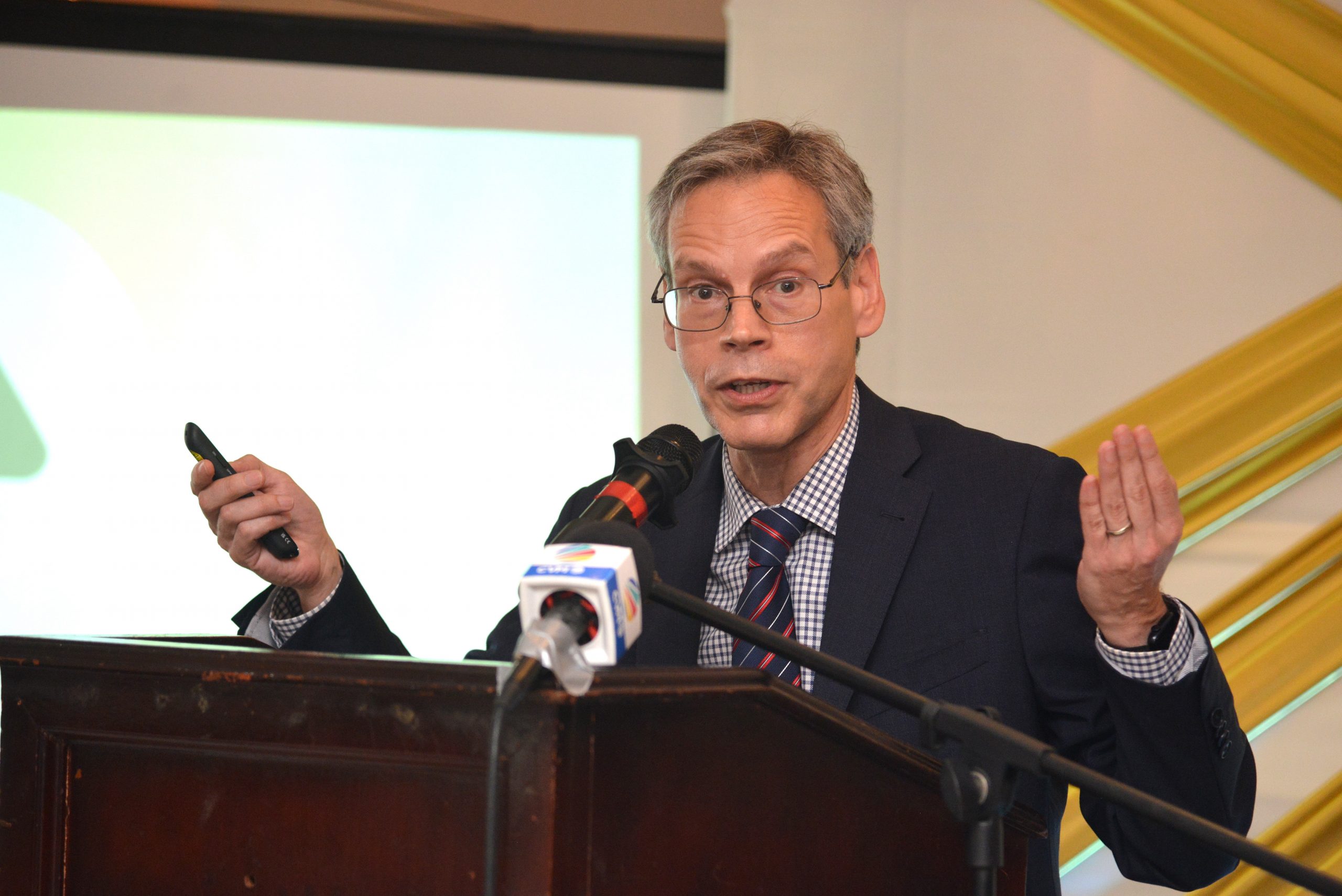Lead Labour Market Specialist, Dr. David Kaplan, of the Inter-American Development Bank, endorsed the pension auto-enrolment proposal developed by the Pension Industry Association of Jamaica (PIAJ), during his presentation to the pension stakeholders. He was speaking at the Association’s annual luncheon held at the Hotel Four Season last Thursday.
Kaplan, who boasts close to 30 years of experience working in labour markets in developing countries, particularly in the areas of labour market regulations and social security and labour market policies drew the attention of scores of pension stakeholders during his thought-provoking presentation entitled, ‘Designing a multi-pillar pension system for a high-informality environment.’ He pointed to a three-pillar system which includes a voluntary savings model, making special mention of the PIAJ’s auto-enrolment proposal.
Pension and the Auto Enrolment process
For the voluntary pillar, the PIAJ’s auto-enrolment proposal could fill the “sufficiency gap” by increasing savings and would likely have a significant impact with minimal fiscal cost, hinted Kaplan. Sanya Goffe, president of the PIAJ, shared her confidence that the Association’s proposal for pension auto-enrolment for Jamaica would increase the low pension participation rate among Jamaicans and agreed with Kaplan that auto-enrolment is part of the solution to the pension problem. “We spent a great deal of time meeting with the stakeholders, conducting the necessary studies to design a programme that would address the present pension challenge. Our goal is to ensure that more Jamaicans in the formal sector who do not presently have a pension can be enroled in a pension arrangement that will provide them with an income in the years to come,” she said.
Through the PIAJ proposal, employers would be required to automatically enrol all employed persons, not currently participating in a pension plan, into any one of the 13 approved retirement schemes with no obligation on the employer to make contributory payments. Once enroled, the employee would always have the option to withdraw, but the experience in other countries has shown that most of those who are auto enroled actually remain in the scheme.
“With pension auto enrolment, the result is often higher levels of pension savings and participation often in the range of 50%-70%. Given that private sector pension coverage in Jamaica is currently between 9-11%, auto enrolment could be a major game changer for Jamaica,” Goffe explained.
Kaplan also cited the correlation between low pension contribution rates and labour market problems and informality. “Many of the problems that the labour market has does not come from the pension system, but that does not exempt us from the responsibility of trying to attack the labour market problems that may come from the pension system.”
To address the relationship between labour market problems and offering sufficient pension coverage, he suggests the adaptation of a universal pension. “A universal pension is a key factor,’ he stated. He continued in his explanation that “a universal pension appropriately integrated into a multi-pillar system can actually also help us to improve labour market incentives.” A universal pension would ensure that all persons of a certain age would receive a pension.
The role of the National Insurance Scheme (NIS)
In Jamaica, the National Insurance Scheme (NIS), a compulsory contributory funded social security scheme covering all employed and self-employed persons on the island, provides benefits on these contributors’ eligibility for retirement. In 2021, the Government of Jamaica through its Ministry of Labour and Social Security, also launched the Social Pension Programme which provides a benefit to Jamaican citizens 75 years and older who are not currently in receipt of a pension and are not living in a government institutionalized care facility; and are generally described as vulnerable. The combination of these two local social programmes, while not yet providing 100% coverage among the most vulnerable, works along with the NIS, to provide greater social security.
Addressing the question of Jamaica adopting a universal pension system, Goffe pointed out that, “The NIS and the Social Pension Programme would need to be considered together when comparing a universal pension as there are gaps. Persons between the ages of 65 and 74 would need to be given some consideration, particularly, the vulnerable within this age group.”
Kaplan also mentioned contributory pensions as part of the three-pillar system. He stated that “A contributory pension, therefore, will not have to provide a full pension on its own but complements a universal pension so that the sum of the two pensions is sufficient. For the very rich, a universal pension would not be ideal, but for lower-income workers, a universal pension would get you a long way toward a ‘sufficient’ pension for them.” He continued, “In the case of low-wage workers, we can either reduce or eliminate their pension contribution entirely. For those who don’t have a contributary pension, give them a non-contributary pension”.
Financial Stability of a Universal Pension
Kaplan was quick to address concerns about financial sustainability. He clarified where the money would come from to finance a universal pension. “The fiscal cost in pensions will be the cost of the universal pension. The contributory pillar is going to be self-financing with the contributions of workers and their employers.” An environment he hopes would be more favourable for the Ministry of Finance and the Public Sector. He further explained that “countries try to, over time, reassign fiscal resources away from contributary pillars which generally the poor do not receive and reassign that to non-contributary pillars.”
Kaplan charged the stakeholders to do their part to improve the efficiency and productivity of the industry. “Let’s make sure we do our part to try to help the labour market do better.”
The event which was organized by the PIAJ, is one of a number of activities that the PIAJ undertakes in its advocacy for greater pension coverage for all Jamaicans.
The next staging of the luncheon is carded for 2024 and promises to deliver even more insight for stakeholders. “We have started the plans for the next staging in the hope that we can continue to apprise our stakeholders of best practices that serve to improve our industry and contribute to national development,” said Goffe.








